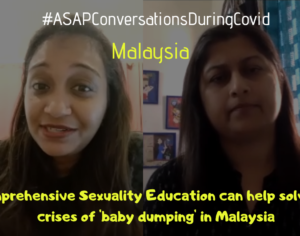Changing Perspectives to Silence Abortion Stigma in Malaysia
Establishing a liberal abortion law does not in itself ensure that women are able to obtain safe procedures. Health providers, legal bodies and the general public need to be made aware of the circumstances under which abortion is allowed and providers need to be trained and facilities equipped.
In Malaysia, abortion laws are fairly liberal. Women can get safe and legal abortions if the procedure will save their lives, or if the pregnancy is a threat to the physical or mental health of the woman. Yet, the access to affordable, safe abortions remains a huge issue in Malaysia, even for those women who satisfy the legal criteria for abortions.
The culprit: abortion stigma. “It is not so much the law, as it is capacity building, and no so much the capacity building, as it is the attitude towards abortions,” says Dr. S.P.Choong, ASAP Steering Committee Chair, a safe abortion provider in Malaysia, and the co-chair of the Reproductive Rights Advocacy Alliance of Malaysia (RRAAM).
Dr. Choong explains that after having examined the law, activists identified the need for capacity building, and for training more providers. But the negative attitude toward abortion makes it extremely difficult for civil societies to hold the government responsible for providing abortion services in state-run hospitals. Currently, most government hospitals that run facilities for childbirth and maternal health, do not offer medical terminations. In recent times, the Ministry of Health has also sought to discourage access to safe abortions by introducing stringent regulations that disqualify some facilities, and cause them to be pronounced “illegal”.
Because of this negligence, a black market for abortions has mushroomed across Malaysia. These facilities offer services at very high prices, making abortions less accessible for women of the middle and lower socio-economic classes, and aggravating the social injustice meted out to women.
In addition, medical abortions are not legal in Malaysia, and Mifepristone, a drug used in combination with misoprostol to perform safe, medical abortions, is not yet registered. Misoprostol, which is also used to treat arthritic pain and gastric ulcers is available, and can be used alone (Read more on our website). But the lack of information, and the inability to discuss the procedure legally form barriers to safe medical abortions.
RRAAM, other local organizations, and international organizations like Women on Waves, have helped women who need safe abortions through hotlines, and by connecting them with service providers. But this is not always easy. Both in the capacity of a provider and an advocate for safe abortions, Dr. Choong has noticed that negative attitudes toward abortions, forces women to remain secretive about their needs.
Statistics and studies however reveal that the unmet need for safe abortion services is high. Only 55% of the population has access to contraception, and about 30% use modern contraceptives. In addition, teenage pregnancy is both highly prevalent and a taboo. About 18 out of every 1000 young girls become mothers, where there is no data on the number of teenage girls with access to contraceptives.
The lack of access to abortion services and the abortion stigma, culminate in two issues: unsafe abortions and baby dumping. “The situation is peculiar to Malaysia,” says Dr. Choong. “Unsafe abortion is lower than some other countries, but baby dumping is a huge problem.” According to statistics published in the Malaysian Insider, a total of 67 children were abandoned in 2005, 83 in 2006, 76 in 2007, 102 in 2008 and 79 in 2009, averaging at one to two babies every week in a country with a total population of just 25.3 million. Several babies were traced to teenage mothers.
Though the government has made some provisions for mothers to anonymously leave their babies in state-run crèches, the dearth of such facilities still drive women to abandon their infants in public places, including dumps and toilets.
“These abandoned babies are the tip of an iceberg,” says Dr. Choong. “Women are clandestine about their abortions. This baby-dumping is an indicator of the number of unwanted pregnancies.”
Though the road ahead is long, Dr. Choong remains positive. RRAAM has been working to promote safe abortions as a reproductive right, and has conducted interventions to change the negative attitude toward abortions. “The result is 50-50. Some people still want to believe that abortions are wrong. Others are surprised to hear about the law, begin to look at the situation rationally, and change their perspectives.”
Read more about Malaysia on CRR and on ASAP.







